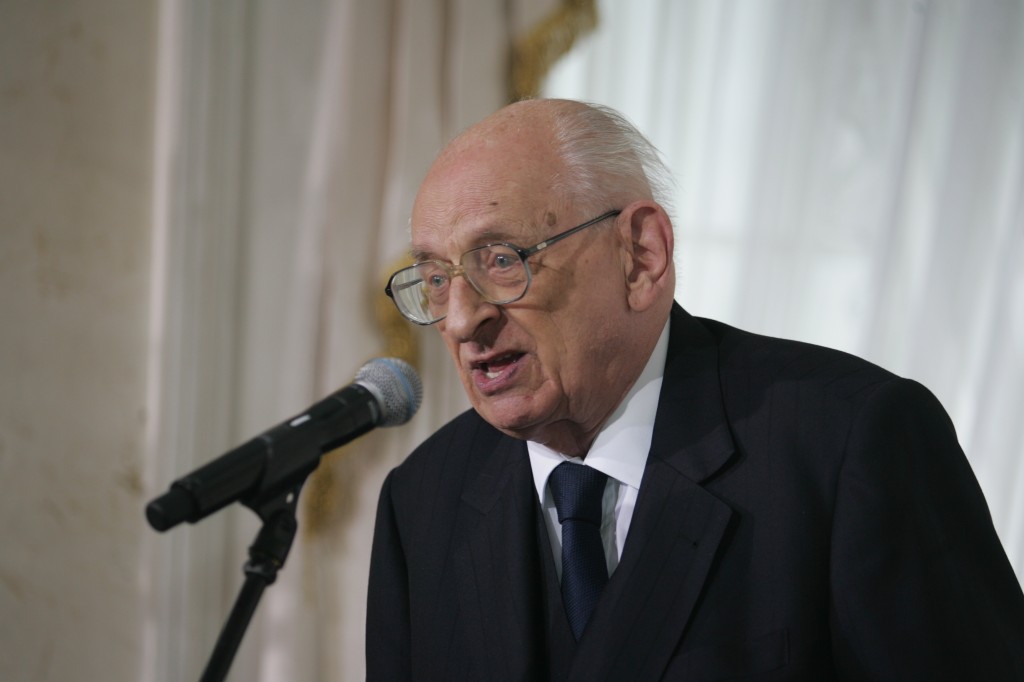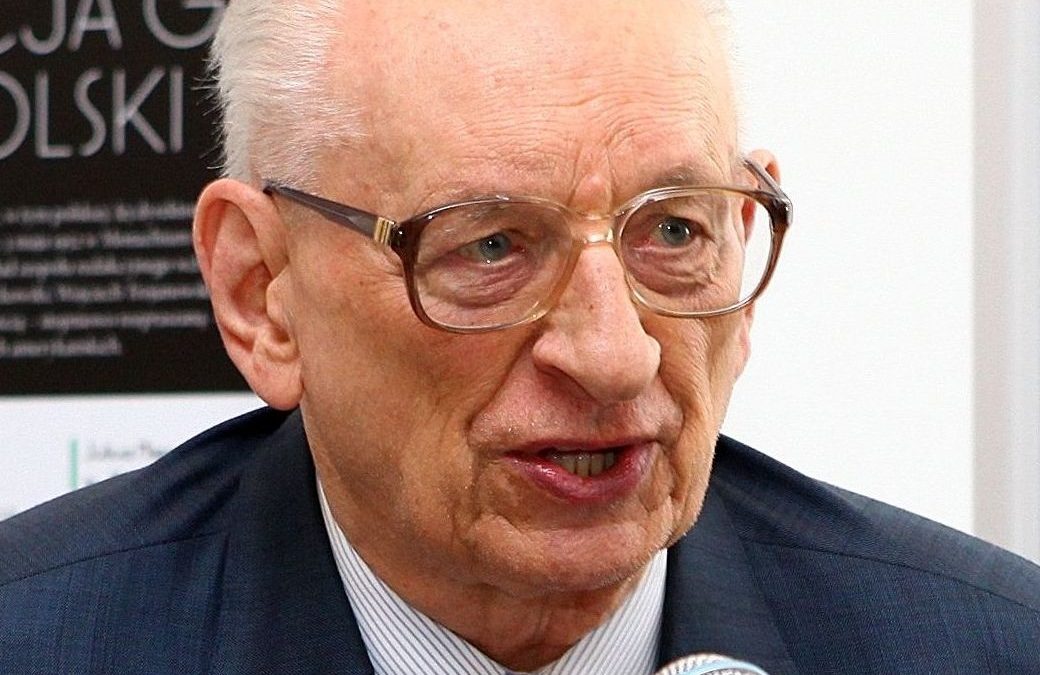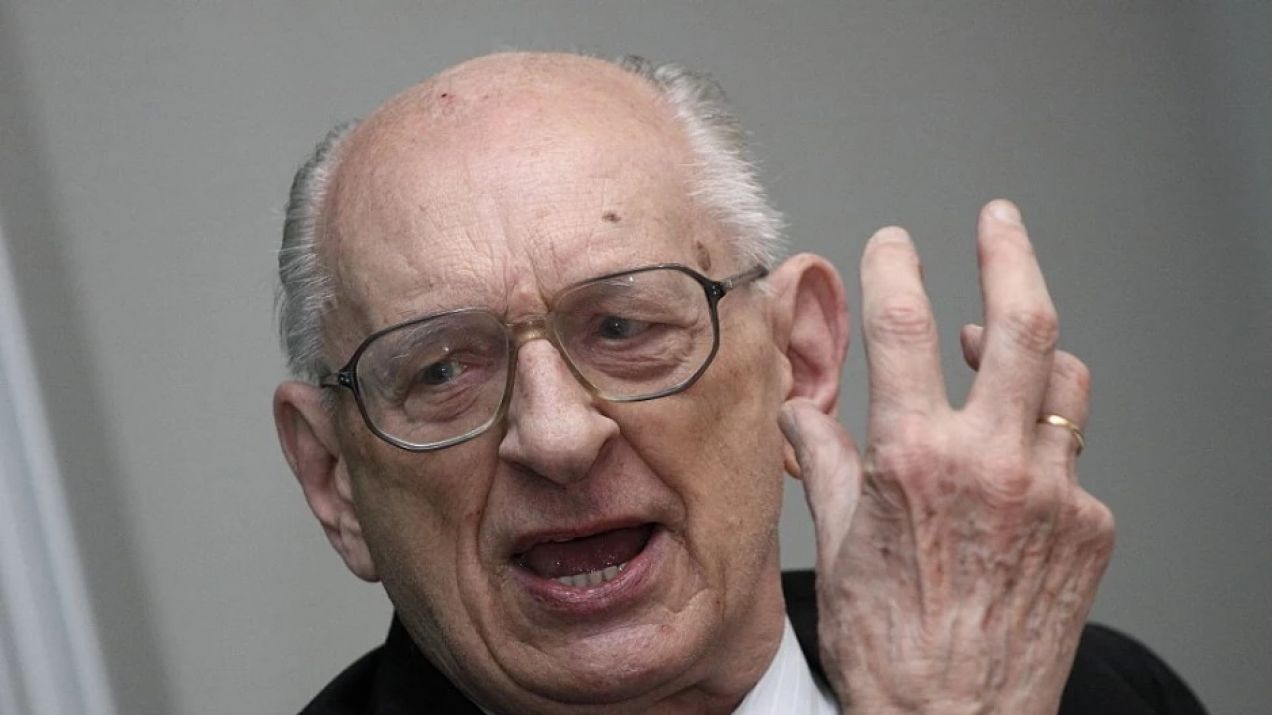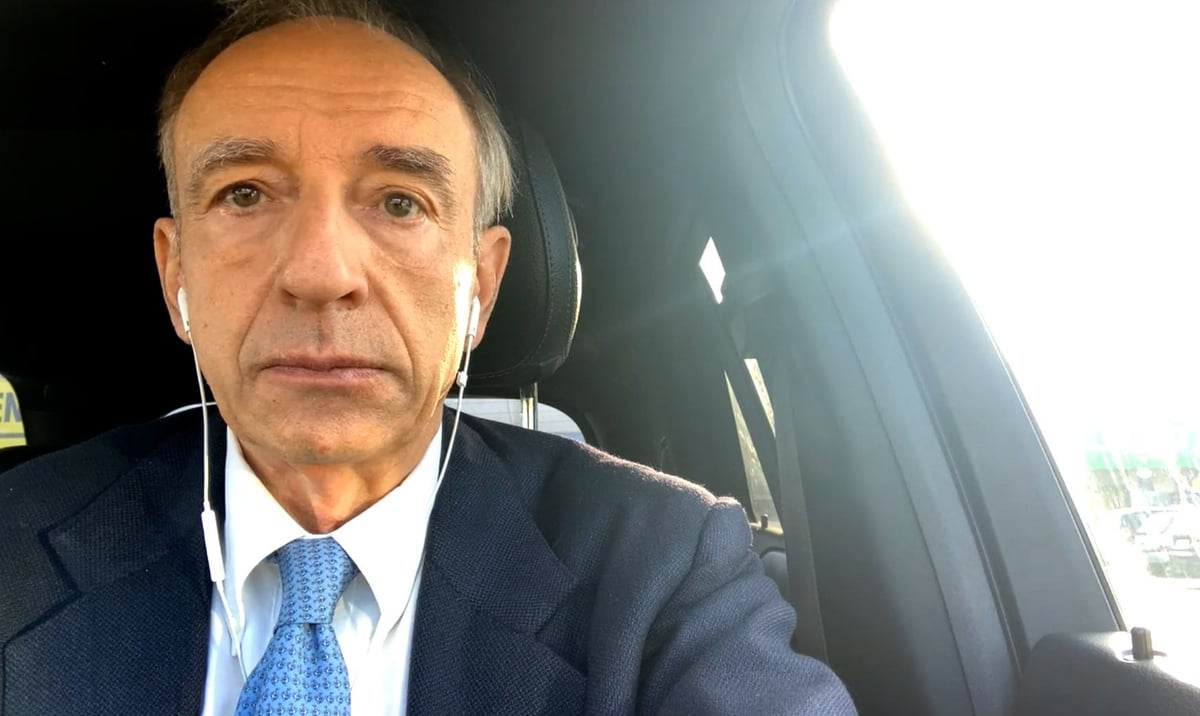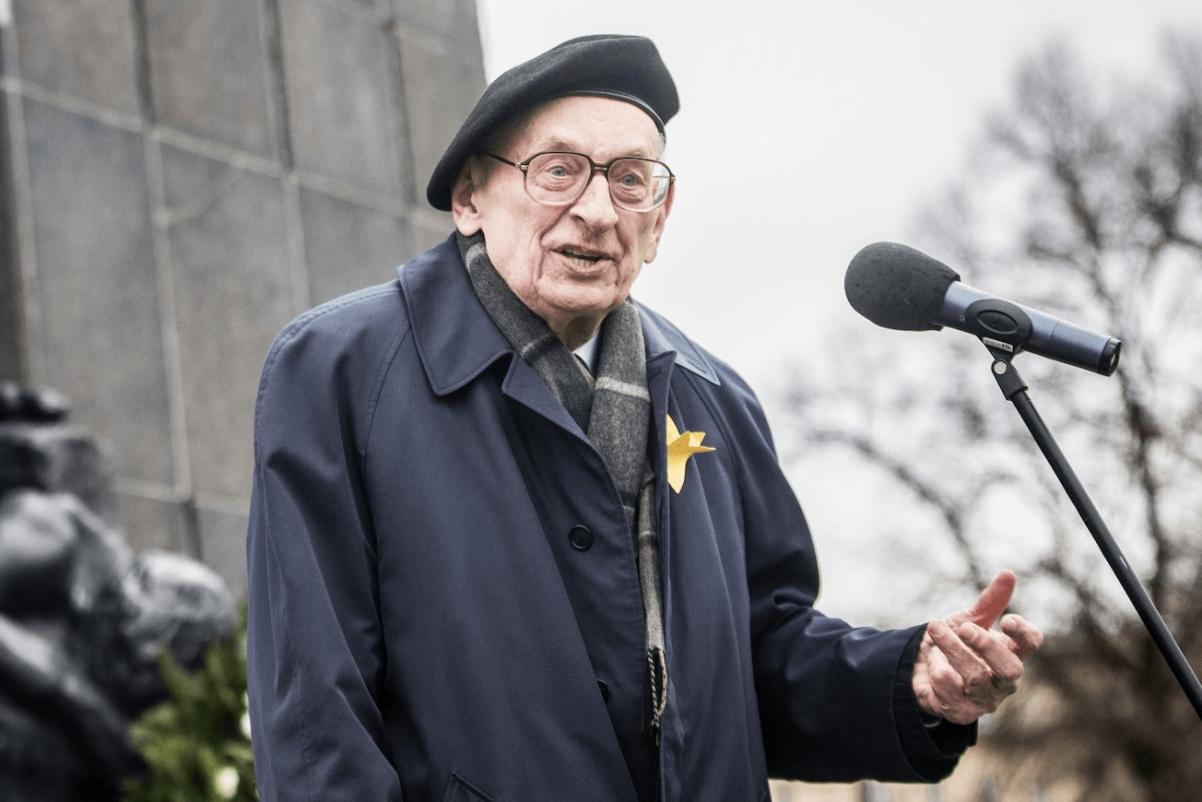
Władysław Bartoszewskiwas a multifaceted Polish individual who worked as a journalist, historian, politician, and social activist. He was a Polish underground resistance fighter during World War II and took part in the Warsaw Uprising. He was a former prisoner of Auschwitz concentration camp.
Because of his involvement in the Home Army (Armia Krajowa, AK) and opposition activities, he was targeted and imprisoned by the communist Polish People's Republic following the war.
Bartoszewski held the position of Minister of Foreign Affairs twice following the fall of the communist regime: once from 2000 to 2001 and again from March through December 1995. In addition, he served as an ambassador and a senator from Poland.
Lech Wałęsa, a Polish anti-Communist activist and eventually president, had a close friendship and ally with Bartoszewski. In this article, we shall examine Władysław Bartoszewski's honorary life in depth.
Early Life Of Wladyslaw Bartoszewski
Bartoszewski, a Polish Catholic, was born on February 19, 1922, in the city of Warsaw. As the son of a bank clerk, he spent his childhood in close proximity to Warsaw's Jewish neighborhood and had a large number of Jewish friends.
In September of 1939, when he was still a youngster, he participated in the defense of Warsaw against the Germans, who had invaded the nation. Bartoszewski, who was 18 at the time, was taken to Auschwitz after being captured in a street roundup in Warsaw in the year 1940. At the time, the Nazi Germans were using Auschwitz for the first time to house Polish resistance members.
Role Of Wladyslaw Bartoszewski In World War II
Bartoszewski served as a stretcher bearer during the Warsaw civil defense in September 1939. He began working in the Polish Red Cross's first social clinic in Warsaw in May 1940.
Bartoszewski was arrested on September 19, 1940, in the Żoliborz neighborhood of Warsaw as part of a surprise public round-up (łapanka), which also included Witold Pilecki and about 2,000 other civilians.
He was held in the Auschwitz concentration camp starting on September 22, 1940 (his prisoner number was 4427). As a result of the Polish Red Cross's efforts, he was freed from Auschwitz on April 8, 1941
Wladyslaw Bartoszewski In Polish Underground State
Bartoszewski contacted the Association of Armed Struggle ("Związek Walki Zbrojnej") after his liberation from Auschwitz. He informed the Home Army's Information Department of the Information and Propaganda Bureau about his concentration camp detention in the summer of 1941.
He joined Zofia Kossak-Szczucka's secret, Catholic, social-educational, and charity Front for the Rebirth of Poland ("Front Odrodzenia Polski") in the summer of 1942. While the German occupation banned Polish higher education, Bartoszewski studied Polish Studies in Warsaw University's underground Humanist Department from October 1941 to 1944.
Bartoszewski joined the Home Army in August 1942 as a reporter in the "P" Subdivision of the Information Department of its Information and Propaganda Bureau. His nickname "Teofil" comes from Jan Parandowski's "The Sky in Flames" character Teofil Grodzicki. He assisted Kazimierz Moczarski in the "P" subdivision two-man P-1 report.
From September 1942, Bartoszewski represented the Front for the Rebirth of Poland in the Provisional Committee for Aid to Jews and its successor, the Council for Aid to Jews (codenamed Żegota). Żegota, a Polish World War II resistance group, aimed to aid Jews during the Holocaust.
The Polish Government supported it in Exile through its Warsaw Delegatura. Bartoszewski remained in Żegota until the Warsaw Uprising. He succeeded Witold Bieńkowski in the Jewish Department of the Delegatura in 1943.
The Catholic Front for the Rebirth of Poland's press organ, "Prawda" ("The Truth"), employed Bartoszewski as editing team secretary from November 1942 to September 1943. Bartoszewski edited "Prawda Młodych" ("The Youth's Truth"), a Catholic journal for university and high school students, from fall 1942 to spring 1944.
The publication was affiliated with the Front for the Rebirth of Poland. Bartoszewski became vice-manager of a Delegatura Department of Internal Affairs branch that helped Pawiak detainees in November 1942. Bartoszewski became a Department Jewish Report writer and vice-manager in February 1943.
During his work for Żegota and the Jewish Report, Bartoszewski provided aid to Warsaw Ghetto Uprising participants in April 1943. Bartoszewski joined the Warsaw Uprising on August 1, 1944. He was an aide to radio post "Asma" commander and editor-in-chief of "The News from the City and The Radio News."
On September 20, General Antoni “Monter” Chruściel, commandant of the Warsaw District of the AK, awarded Bartoszewski the Silver Cross of Merit following a proposal from Colonel Jan Rzepecki, chief of the Information and Propaganda Bureau in General Headquarters of the Home Army.
He became Second Lieutenant on October 1 when AK leader general Tadeusz “Bór” Komorowski selected him (Rzepecki suggested it). He got the Cross of Valor on Oct. 4.
Bartoszewski's Post-Wwii Journey
Bartoszewski departed Warsaw on 7 Oct 1944. At Home Army General Headquarters in Kraków, he resumed his underground work in the Information and Propaganda Bureau. He was Information Bulletin editorial team secretary from November 1944 until January 1945.
He returned to Warsaw in late February 1945 to join the NIE resistance's information and publicity unit. Kazimierz Moczarski supervised Bartoszewski in the sixth Delegatura unit, which handled information and propaganda from May to August 1945. He was admitted to AK service on October 10, 1945.
Bartoszewski began working with the Institute of National Remembrance at the government presidium and the Head Commission of Examination of German Crimes in Poland in the autumn of 1945.
He provided helpful information regarding Nazi atrocities, concentration camps, jails, and the Jewish holocaust under the occupation. His editorial duties began in February 1946 at Gazeta Ludowa, the Polish People's Party's major press organ. Soon after, he joined the PSL, the sole major anti-communist party.
Gazeta Ludowa's articles featured notable figures of the Polish Underground State (interview with Stefan Korboński, funeral report of Jan Piekałkiewicz) and events related to the Warsaw Uprising (Dzień Walczącej Stolicy sketches).
Due to his PSL work, Bartoszewski was repressed by the security services. He was wrongly accused of spying and detained by the Polish Ministry of Public Security on November 15, 1946.
After being transported to Mokotów Prison in December, he was freed on April 10, 1948, with the assistance of Zofia Rudnicka, a former chief of Żegota and current Ministry of Justice employee.
Bartoszewski was admitted into the third year of Polish Studies in December 1948, but his 1949 arrest and five-year jail sentence prevented him from graduating. Bartoszewski was detained again on 14 December 1949. He was condemned to eight years in jail by the Military District Court on 29 May 1952 for false espionage.
He was transferred to Rawicz and Racibórz prisons in April and June 1954. Due to poor health, he was paroled for a year in August 1954. During de-Stalinization, Bartoszewski was notified he was unfairly condemned on March 2, 1955.
Career Of Wladyslaw Bartoszewski
Bartoszewski resumed journalism after his release and wrongful conviction. He was editor-in-chief of Polish Librarians Association specialty publishing firms since August 1955. He had been producing articles in "Stolica" weekly since July 1956 (he had been a member of an editorial section since January 1957 and its secretary from summer 1958 to December 1960).
He began working with "Tygodnik Powszechny" ("Universal Weekly") in August 1957. He has been an editorial member since July 1982. He was accepted again by Warsaw University's Linguistic Department extramurally in November 1958.
Despite submitting his master's thesis under Professor Julian Krzyżanowski's supervision, he was dismissed from the university in October 1962 by the vice-chancellor.
He got the Righteous Among the Nations certificate and medal in 1966 from the Council for Aid to Jews. In November–December 1963, Bartoszewski met Austrian intellectuals and politicians in Austria.
He began working with Radio Free Europe in November 1963. In subsequent years, he visited Germany, Great Britain, Italy, Israel, and the United States, primarily interacting with Polish emigrant representatives like Jan Nowak-Jeziorański, Jan Karski, Czesław Miłosz, and Gustaw Herling-Grudziński.
He served as head of the Warsaw Department of the Society of Book Lovers ("Towarzystwo Przyjaciół Książki") from 1969 to 1973 and joined the Polish PEN board in December 1969. He was Polish PEN chief secretary from 1972-1983.
From 1973 to 1982 and 1984 to 1985, he lectured as a senior lecturer. His courses in the Institute of Modern History in the Humanistic Science Department of KUL (Catholic University of Lublin) focused on war and occupation. He participated in the First Polish Culture Congress in December 1981, which was stopped by martial law.
He taught at Munich's Ludwig-Maximilian University's Institute of Political Science Faculty of Social Sciences from 1983 to 1988 and the Media Science Institute from 1989 to 1990. The Bavarian government awarded him a professorship. In 1984, he got an honorary degree from Hebrew College in Baltimore and a certificate from the American Jewish Committee in New York.
In May 1984, Bartoszewski became a full member of the Józef Piłsudski Institute of America. He was a deputy chairman of Oxford's Institute of Polish-Jewish Studies from 1986. He taught at the Catholic University of Eichstätt-Ingolstadt's Faculty of History and Social Sciences in 1985. He taught at Augsburg University's Institute of Political Science in the Philosophy and Social Sciences Department from 1988-1989.
Władysław Bartoszewski participated in international conferences and symposia on World War II, the Jewish genocide, Polish-German and Polish-Jewish ties, and the role of Polish intellectuals in politics. He gave talks and reports at international conferences.
Opposition Activity Of Wladyslaw Bartoszewski
In addition to being prohibited from publishing his works in Poland until the fall of 1974 because of his opposition activities and relationships in Western nations, he also experienced other forms of persecution in 1970, including searches, passport rejections, and the distribution of forgeries.
He participated in the campaign in 1974 to free the condemned Ruch group members, including Stefan Niesiołowski and Andrzej Czuma. Bartoszewski was among the first intellectuals to sign a letter in January 1976 opposing proposed amendments to the People's Republic of Poland's constitution.
He has been lecturing at the "Flying University" and has been involved in the founding of the Society for Educational Courses since 1978. He signed the intellectuals' letter to the workers from the Polish coast who were demonstrating on August 21, 1980. Between 1989 and 1991, he belonged to Solidarity.
He was detained at the Białołęka jail and then the Internment Center in Jaworze at the Drawsko Pomorskie Military Training Area following the declaration of martial law on December 13, 1981. Thanks to the encouragement of Polish and international intellectual communities, he was freed on April 28, 1982.
Activities Of Wladyslaw Bartoszewski In The Third Republic Of Poland
Bartoszewski was Polish Ambassador to Austria from September 1990 to March 1995. As the lone foreign speaker, he spoke at the Bundestag and Bundesrat's somber joint session on the 50th anniversary of World War II on 28 April 1995. After Lech Wałęsa's presidential tenure ended on December 22, 1995, he resigned from his position.
Bartoszewski returned as Polish Internal Affairs chief in June 2000 under Jerzy Buzek. He was a fourth-term senator and Office for International Affairs and European Integration chair from 1997 to 2001. He presided over the Senate's first session as Senior Speaker.
The Office of the Chairman of the Council of Ministers (Prime Minister Donald Tusk) appointed Bartoszewski Secretary of State and plenipotentiary for foreign affairs on November 21, 2007.
Bartoszewski chaired the National Auschwitz Museum International Council from June 1990. President-appointed member of the National Council for Polish-Jewish Relations from 1991 to 1995. He was the Polish PEN deputy chairperson from March 1995. He was awarded an honorary doctorate from the University of Wrocław in 1996.
Bartoszewski led the Council for Combat and Martyrdom Memory in June 2001. He spoke on behalf of Polish concentration camp inmates on the 60th anniversary of Auschwitz-Birkenau's liberation on January 27, 2005.
He championed Polish-Jewish and Polish-German reconciliation for years. He helped preserve the Polish Underground State, Warsaw Uprising, and authoritarian atrocities via journalism and academia.
Bartoszewski led the LOT Polish Airlines board from 26 January to 29 June 2006. He joined the Polish Writers' Association. He resigned as Warsaw's Polish Institute of International Affairs chair on August 29, 2006.
The then-Minister of Foreign Affairs Anna Fotyga did not respond to accusations by Deputy Minister of Defense Antoni Macierewicz that many former Ministers of Foreign Affairs of the Third Republic of Poland were former Soviet agents, based on "fałszywkas" files from the SB secret police.
Bartoszewski's scholarship was disputed. He called himself "professor" despite having no university degree. The German Ministry of Foreign Affairs deleted "professor" before Bartoszewski's name from its website after German and Polish academics objected.
Bartoszewski taught graduate-level history courses at several prestigious universities, including the KUL (John Paul II Catholic University of Lublin), which listed him as a reader in modern history (and chair of Polish Postwar History) in the Faculty of Humanities from 1973 to 1985 and awarded him an honorary doctorate in 2008.
Personal Life Of Wladyslaw Bartoszewski
Antonina Mijal was the first spouse of Władysław Bartoszewski, but they divorced. Later, in 1967, he wed Zofia Bartoszewska, and the two of them stayed wed until he died in 2015. 1955 saw the birth of his son, Władysław Teofil Bartoszewski. He is a scholar historian who has authored works on the history of Polish Jews.
Awards And Honors Of Wladyslaw Bartoszewski
Diplomat and philanthropist Wladyslaw Bartoszewskireceived many awards during his life. These awards demonstrate his dedication to justice, healing, and peace.
Bartoszewski received the Silver Cross of Merit with Swords and the Cross of Valor in 1944 for his bravery during a turbulent time. He received the Knight's Cross of the Polonia Restituta in 1963 and the Righteous Among the Nations title in 1965 for saving Jews during the Holocaust as his career progressed.
Bartoszewski received multiple honorary doctorates for his international contacts and intellectual achievements. He received honorary doctorates from London and Baltimore universities in 1981 and 1984, respectively. In 1983, Vienna awarded him the Herder Prize for his diplomatic work.
Bartoszewski received several accolades for his peace and reconciliation work, including the 1986 German Book Trade Peace Prize and the 1996 Düsseldorf Heinrich Heine Prize. He got the Grand Cross of Merit of the Federal Republic of Germany in 2001 for his diligent efforts to promote Pole-German-Jewish collaboration.
Bartoszewski's humanitarianism went beyond diplomacy. He received the Knight Grand Cross of the Order of St. Gregory the Great, the highest papal lay accolade, and the Knight of Freedom accolade in 2006.
His work fostering international understanding earned him the Jan Nowak-Jezioranski Prize of the US Embassy in 2007 and the International Adalbert Prize in Bratislava in June 2007.
He received the inaugural Sinti and Roma European Civil Rights Prize in 2008 for his minority rights and social justice work. Bartoszewski received the Commander of the Legion of Honor in 2009 for his cultural and diplomatic achievements to France. Poland awarded him the "Bene Merito" accolade the same year.
Bartoszewski received the Order of the White Double Cross, 2nd class, in 2012 for his diplomatic and international relations work. He earned the Elie Wiesel Award in 2013, solidifying his reputation as a Holocaust memory and healing champion.
Wladyslaw Bartoszewski - FAQs
Who Was Władysław Bartoszewski?
Władysław Bartoszewski was a Polish scholar who lived through the Holocaust and worked for political change.
When Was Władysław Bartoszewski Born?
The birthdate of Władysław Bartoszewski is February 19, 1922.
Who Was The Spouse Of Władysław Bartoszewski?
Zofia Bartoszewska was the wife of Władysław Bartoszewski.
Conclusion
The life and legacy of Władysław Bartoszewski are a tribute to his bravery, tenacity, and unshakable dedication to remembrance and justice. His ability to survive the Holocaust his commitment to keeping the horrors of it, and the brave acts of good people alive forever have left a lasting impression on history.
As a politician, diplomat, and historian, Bartoszewski helped to close the gap between the past and the present by persistently promoting international understanding and peace. His life serves as a reminder that the human spirit can triumph over hardship to uphold the ideals of humanism, tolerance, and compassion even under the most dire circumstances.
